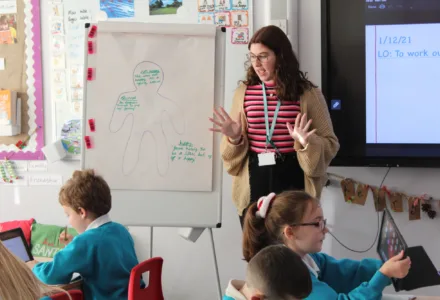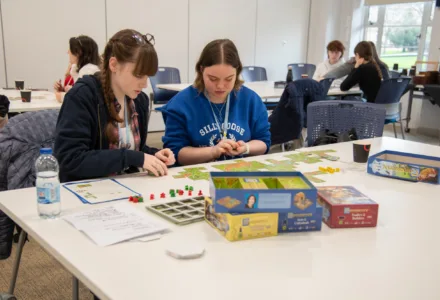Find your course
Ranked 1st in the UK for Teaching Quality (The Times and Sunday Times Good University Guide 2025)
Showing 79 courses

Business
BA (Hons)
Business
Business (Finance)
BA (Hons)
Business (Finance)
Business (Marketing)
BA (Hons)
Business (Marketing)
Criminology
BA (Hons)
Criminology
Early Childhood Studies
BA (Hons)
Early Childhood Studies
Education Studies
BA (Hons)
Education Studies
English Language & Teaching
BA (Hons)
English Language & Teaching
English Literature
BA (Hons)
English Literature
Health & Social Care
BSc (Hons)
Health & Social Care
Health & Wellbeing in Early Childhood
BA (Hons)
Health & Wellbeing in Early Childhood
History
BA (Hons)
History
Military History
BA (Hons)
Military History
Primary Education with QTS
BA (Hons)
Primary Education with QTS
Psychology
BA (Hons)
Psychology
Sociology
BA (Hons)
Sociology
Special Educational Needs, Disability & Inclusion (SENDI)

Sport, Coaching & Physical Education
BSc (Hons)
Sport, Coaching & Physical Education
Theology, Philosophy & Ethics
BA (Hons)
Theology, Philosophy & Ethics
Archaeology and History
BA (Hons)
Archaeology and History
Education Studies and English
BA (Hons)
Education Studies and English
Education Studies and History
BA (Hons)
Education Studies and History
Education Studies and Sociology
BA (Hons)
Education Studies and Sociology
Education Studies and Special Educational Needs, Disability & Inclusion (SENDI)

Education Studies and Sport
BA (Hons)
Education Studies and Sport
Education Studies and TESOL
BA (Hons)
Education Studies and TESOL
Education Studies and Theology, Philosophy & Ethics

English and History
BA (Hons)
English and History
English Literature and TESOL
BA (Hons)
English Literature and TESOL
History and Theology, Philosophy & Ethics

Psychology and Business
BA (Hons)
Psychology and Business
Psychology and Counselling
BA (Hons)
Psychology and Counselling
Psychology and Early Childhood Studies
BA (Hons)
Psychology and Early Childhood Studies
Psychology and Education Studies
BA (Hons)
Psychology and Education Studies
Psychology and English
BA (Hons)
Psychology and English
Psychology and Sociology
BA (Hons)
Psychology and Sociology
Psychology and Special Educational Needs, Disability & Inclusion (SENDI)

Psychology and Sport
BA (Hons)
Psychology and Sport
Sociology and Sport
BA (Hons)
Sociology and Sport
Special Educational Needs, Disability & Inclusion (SENDI) and Early Childhood Studies

Special Educational Needs, Disability & Inclusion (SENDI) and Sociology

Special Educational Needs, Disability & Inclusion (SENDI) and Sport

Special Educational Needs, Disability & Inclusion (SENDI) and Theology, Philosophy & Ethics

FdA Early Childhood Education in Practice

FdA Early Childhood Education in Practice (Grantham)

FdA Education in Practice

FdA Education in Practice (Grantham)

FdA Primary Teaching Studies

Health & Social Care Practitioner (Grantham)

Professional Practice in Special Educational Needs & Disability (SEND) (Grantham)

Early Childhood Education in Practice
BA (Hons)
Early Childhood Education in Practice
Early Childhood Education in Practice (Graduate Practitioner)

Education in Practice
BA (Hons)
Education in Practice
Primary Teaching Studies with QTS
BA (Hons)
Primary Teaching Studies with QTS
Children’s Literature and Literacies

Early Years Education

Education
MA
Education
Education (English as an Additional Language)

Education with TESOL

Educational Leadership and Management

English Literature (MA)

Health & Social Care Leadership

International Business

International Education

International Postgraduate Certificate in Education

Master of Business Administration (Strategic Leadership)

Special Educational Needs and Disabilities (SEND)

Theology & Religious Studies

Assessment Only Route to QTS (Primary and Secondary)
Teacher Training
Assessment Only Route to QTS (Primary and Secondary)
Certificate in Education - Teaching Post-16 and Further Education (SEND)

Certificate in Education (Teaching Post-16 and Further Education)

PGCE Primary (Full Time)

PGCE Primary (Part-Time)

PGCE Secondary
PGCE
PGCE Secondary
Primary Teacher Apprenticeship (QTS)
Teacher Training
Primary Teacher Apprenticeship (QTS)
Professional Graduate Diploma in Education -Teaching Post-16 and Further Education (SEND)

Professional Graduate Diploma in Education (Teaching Post-16 and Further Education)

Secondary Teacher Apprenticeship (QTS)
Teacher Training
Secondary Teacher Apprenticeship (QTS)
EdD (Doctorate of Education)

PhD (Doctor of Philosophy)
Interested in joining us?
Open days are the best way to find out what BGU has to offer.
Download your copy of our prospectus to find out more about life at BGU.


